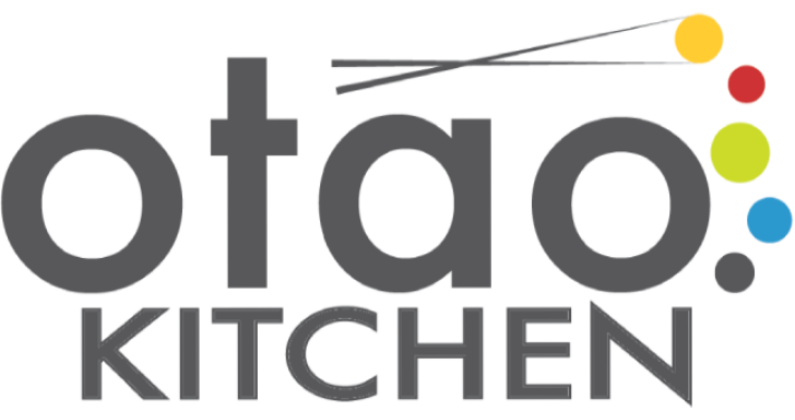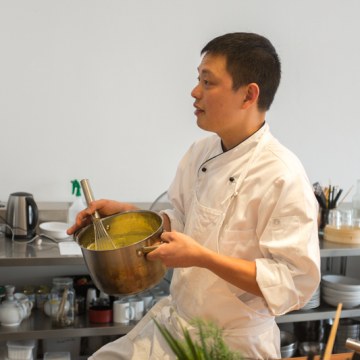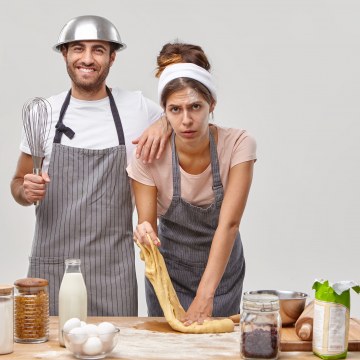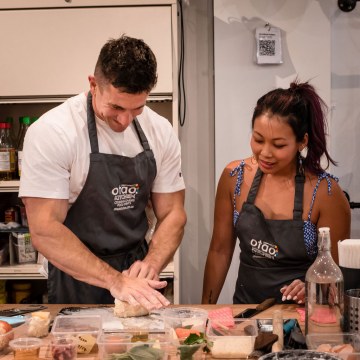But starting out in the kitchen can feel overwhelming—what tools do you need? Where do you begin? That’s where NDIS-friendly cooking classes come in. These classes create a supportive space where participants can learn at their own pace, gain valuable life skills, and even enjoy the social experience of cooking with others.
At Otao Kitchen, we believe every person deserves the chance to feel proud of their creations and confident in their abilities. Our hands-on cooking classes are designed to make the kitchen less intimidating and more exciting, showing participants that they really can cook delicious meals for themselves and others.
1. Why Cooking Skills Matter for Independence
Cooking is one of the most important skills for independent living. Being able to plan, prepare, and enjoy your own meals means you can make healthier food choices, save money, and have control over what you eat.
For NDIS participants, these skills go beyond the kitchen. They provide a sense of self-reliance that can make everyday life easier. Simple things like deciding what to have for dinner or being able to make a snack when you want one can feel empowering.
Learning to cook also encourages planning and organisation—from making a shopping list to understanding how to store food safely. These are everyday tasks that build confidence and help participants feel more capable in other areas of life.
In short, cooking isn’t just about food. It’s about having the ability to look after yourself and feel proud of what you can do.
2. Beyond the Kitchen: The Personal Benefits of Learning to Cook
Cooking classes don’t just teach recipes—they help people grow in many ways.
For one, they build confidence. Trying something new, like chopping vegetables or using a stove, can feel scary at first. But with the right guidance, participants quickly see that they can do more than they thought. Each small success in the kitchen adds up to a big boost in self-esteem.
Cooking also improves motor skills and cognitive abilities. Measuring ingredients, stirring, or even kneading dough are simple activities that help with coordination. Following a recipe step-by-step improves focus, memory, and problem-solving.
And let’s not forget the emotional side of cooking. Preparing food can be relaxing and creative. It gives people a way to express themselves—choosing flavors they enjoy or decorating a dish in their own style. This sense of creativity and achievement is deeply rewarding.
For many participants, the kitchen becomes more than a place to make meals. It becomes a space for growth, confidence, and joy.
3. The Social Side of Cooking Classes
Cooking is even better when you share the experience. For many NDIS participants, joining a cooking class means more than learning new skills—it’s a chance to meet people, connect, and have fun together.
Group cooking classes are a relaxed way to spend time with others who enjoy food. Participants can work together, share tasks, and celebrate their creations as a team. This builds not only cooking skills but also communication and teamwork abilities.
There’s also something special about sharing a meal at the end of class. Sitting around the table, tasting the dishes everyone helped make, creates a feeling of pride and belonging. It’s a reminder that food can bring people together in a really powerful way.
4. How Otao Kitchen Supports NDIS Participants
At Otao Kitchen, we believe everyone deserves the chance to feel confident in the kitchen, no matter their starting point. That’s why our NDIS cooking classes are carefully designed to make the experience inclusive, practical, and fun for every participant.
First, we focus on creating a safe and supportive environment. Our purpose-built kitchen in Abbotsford is designed for comfort and accessibility, making it easy for participants to move around, handle tools, and focus on the experience without feeling overwhelmed.
Second, our friendly and experienced chefs understand that everyone learns differently. They take the time to explain each step, demonstrate techniques slowly, and offer plenty of one-on-one support when needed. From learning how to chop vegetables safely to plating a beautiful dish, participants are guided with patience and encouragement at every stage.
We also adapt our classes to suit different needs and abilities. For some, that might mean starting with very simple recipes that build confidence. For others, it could involve exploring more complex meals to expand their cooking skills. We can adjust tools, recipes, and cooking methods so that no one feels left behind.
And of course, it’s not just about cooking—it’s about having fun. Our classes are interactive and social, turning the kitchen into a place of laughter, learning, and creativity. Participants leave with more than a new recipe—they leave with a sense of achievement and a feeling of connection.
Whether the goal is to prepare healthier meals, gain more independence at home, or simply enjoy a day of hands-on learning, Otao Kitchen makes cooking accessible and enjoyable for all.
5. Taking the First Step: How to Get Started
Starting something new can feel big—but taking that first step is worth it.
If you or someone you support wants to join, booking an NDIS cooking class at Otao Kitchen is simple. You can contact us to discuss needs, preferences, and goals, and we’ll help design the perfect experience.
Remember, these classes are more than cooking lessons. They’re a journey toward independence, creativity, and connection. Each new dish learned is a step toward greater confidence in the kitchen—and in life.
Conclusion
Cooking builds so much more than meals. It teaches independence, confidence, and skills that last a lifetime. For NDIS participants, it opens the door to more choice, more creativity, and more joy.
Ready to start the journey?
Join Otao Kitchen’s NDIS Participant Cooking Classes and discover just how fun and empowering cooking can be.

















































